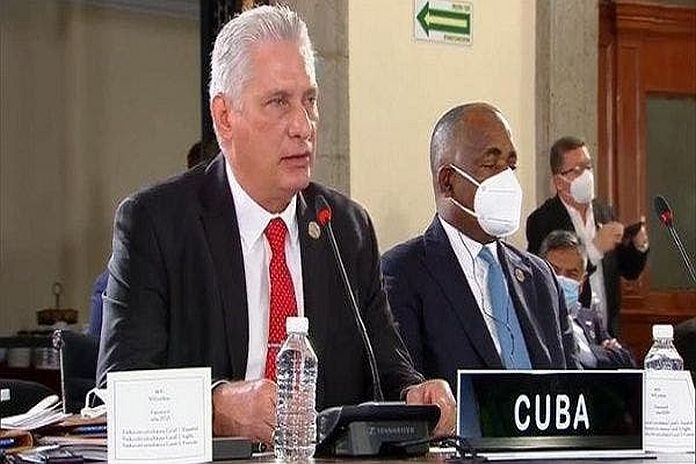CUBA / MEXICO (teleSUR) – Speaking at the VI Summit of the Community of Latin American and Caribbean States (CELAC), Cuba’s president Miguel Diaz-Canel offered Cuban-produced COVID-19 vaccines to fight the pandemic in the region; meanwhile, during the celebrations of the Mexican independence on Thursday acknowledged president Andres Manuel Lopez Obrador (AMLO) for calling the US to lift its economic blockade against Cuba.
Cuba offers its vaccines to CELAC Members
President Miguel Diaz-Canel noted that the Cuban biotechnology industry had produced already three vaccines and two vaccine candidates. The achievement was possible thanks to Cuban Revolution leader Fidel Castro’s idea to promote scientific and technological development on the Caribbean island.
He also highlighted that CELAC represents the yearnings of Latin American independence leaders, adding that it is necessary to deepen regional integration, cooperation, and solidarity.
Diaz- Canel warned that the Cuban people would defend the socialist state while urging for the lifting of the inhuman US economic and financial blockade. He praised the respectful dialogue among the Venezuelan government and opposition sectors in Mexico while also denouncing US sanctions imposed on Nicaragua.
The Cuban president demanded the continuation of the peace process in Colombia, the restitution of Argentina’s sovereign rights over the Malvinas islands, and the fulfilment of the commitment to a decolonized, free, and independent Puerto Rico.
He expressed the Cuban Revolution’s support to Caribbean countries in their claims for reparations for the damages caused by colonialism and slavery.
Lifting US economic blockade against Cuba
“President AMLO, we will always remember your solidarity amidst the COVID-19 pandemic and the strengthening of the blockade. Among all the brother countries that our America gave us, Mexico is one of the dearests ones to Cuba,” Diaz-Canel stated.
The Donald Trump administration implemented over 240 economic sanctions against Cuba, including the suspension of non-family remittances, a ban on the import of products from any country containing over 10 percent of US components, and the criminalization of ships and insurance companies linked to the transportation of fuels to this Caribbean nation.
These measures caused economic losses valued at US$20 billion to Cuba, causing an impact on the welfare of the population, who has also suffered the consequences of the economic recession prompted by the pandemic. To counteract the effects of the blockade, Mexico sent over 100,000 barrels of diesel, oxygen tanks, buckets, syringes, and food to supply Cuban hospitals.
“The Cuban people only want to live in peace, and we accompany them in this battle,” Miguel Diaz Reynoso, the Mexican ambassador to Cuba, stated and recalled with gratitude the help given by hundreds of Cuban doctors in the most critical stage of the pandemic.
During his speech to the Community of Latin American and Caribbean States (CELAC) in July, AMLO proposed to declare Cuba a “world heritage” for resisting against the United States, an issue on which he insisted on Thursday.
“One country may or may not agree with the Cuban Revolution or its government, but having resisted 62 years without submission is an undeniable historical feat,” AMLO said and urged the US to separate politics from humanitarian issues.
Source: TeleSUR





